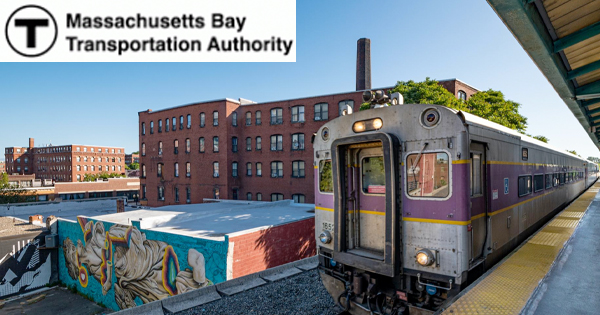
Thanks to federal funding awarded for a grant application from the City of Lynn, planning for a new Massachusetts Bay Transit Authority (MBTA) commuter rail station in West Lynn can now begin, a hopeful step forward for commuters looking for a direct connection.
Lynn was granted $561,000 through the U.S. Department of Transportation’s Reconnecting Communities and Neighborhoods (RCN) Grant Program, which provides funding to remove or mitigate highways and other transportation infrastructure that create barriers for community connectivity. The federal program includes $3.3 billion in grant awards for 132 communities.
The RCN grant is greenlighting Lynn’s River Works Reimagined community planning study, which will be used to initiate the funding, design and construction of a relocated River Works commuter rail station. The project intends to reconnect West Lynn by relocating the River Works station one third of a mile north of its current location and making it publicly accessible. The station, located on Western Avenue and operating on the Newburyport/Rockport line, currently serves only employees of General Electric. Ridership is low, with only one percent of GE employees using the service on an average day.
Lynn residents were without a public commuter rail stop from October 2022, when the downtown station was closed due to deterioration and safety concerns, until an interim station opened last December. Citywide, 19 percent of households do not have access to a vehicle. The need for improved, affordable transportation options is especially great in the neighborhoods adjacent to the proposed station, where upwards of 50 percent of households do not own a vehicle.
“Our transportation infrastructure currently presents a barrier between neighborhoods,” Lynn Mayor Jared C. Nicholson wrote in a letter to the U.S. Department of Transportation, prior to the interim station opening. “The activation of this stop into an accessible, permanent station will better connect our West Lynn neighborhood to Lynn’s premier waterfront, maximize our previous investments in creating a bike- and pedestrian-based community path, provide a compelling alternative to vehicular travel in the region, unlock thousands of units of much-needed new housing development in our community, and provide our residents with direct transportation to better paying jobs.”
The relocated, fully accessible River Works station would enhance regional access to jobs in Boston and should reduce vehicle miles traveled. It would also support the development of 66 acres of vacant land running alongside the current Rivers Works tracks, with the potential of creating nearly 3 million square feet of new housing, commercial, and industrial development, along with green open space and a waterfront pedestrian corridor as conceptualized in Vision Lynn.
“The rail stop will be newly accessible to current area residents, as well as serve as the centerpiece of a new transit-oriented multi-use development, bringing much needed housing and economic redevelopment to this underutilized area,” said Sen. Elizabeth Warren. “Investing in quality public transit will create a real alternative to driving in Lynn.”
“Every community in the Commonwealth needs to help create new housing to deal with the current shortage, and this is an example of federal dollars investing in a city that is hoping to do just that. A public River Works station will be a major step towards creating transit-oriented neighborhood featuring dense housing and new job opportunities in our community.”
Aaron Clausen, Principal Planner for the City of Lynn
Throughout the planning process, the city intends to continue its community engagement techniques from Vision Lynn, the Lynn Transit Action Plan, and the ongoing South Harbor Implementation Plan. The design of the new station will address existing flood risks, which are expected to worsen as the climate warms. The planning process will explore a number of actions to mitigate the effects of climate change including addressing the neighborhood’s heat vulnerability through the planting of new trees and green infrastructure, station design elements that reduce heat absorption, improved pedestrian and bicycle connections and improved intermodal connections to bus transit. Another benefit includes a safer, Americans with Disabilities Act-compliant crossing of the railroad — in contrast to the current station that is inaccessible to people who cannot climb stairs.
This rail line is expected to be the first to be converted to electric traction. The MBTA’s plans for regional rail through electrification of the commuter rail would drastically improve transit service to Lynn, increasing frequency and reliability. In-fill stations like this one at River Works are crucial to the overall vision for improved transit access along the environmental justice corridor. The project will be coordinated with other MBTA resiliency and transformational projects, including a future replacement of the nearby Saugus River Drawbridge.
The RCN grant application was developed and submitted in partnership with the MBTA and technical writing support from Bowman Consulting Group. The planning study will provide a basis to generate construction funding support, but future phases of the project are likely to be advanced by the MBTA.
The above press release was submitted to us by Mayor Nicholson’s office.
If you have a news story that you would like to share, please contact us via email or call 781-780-9460.

